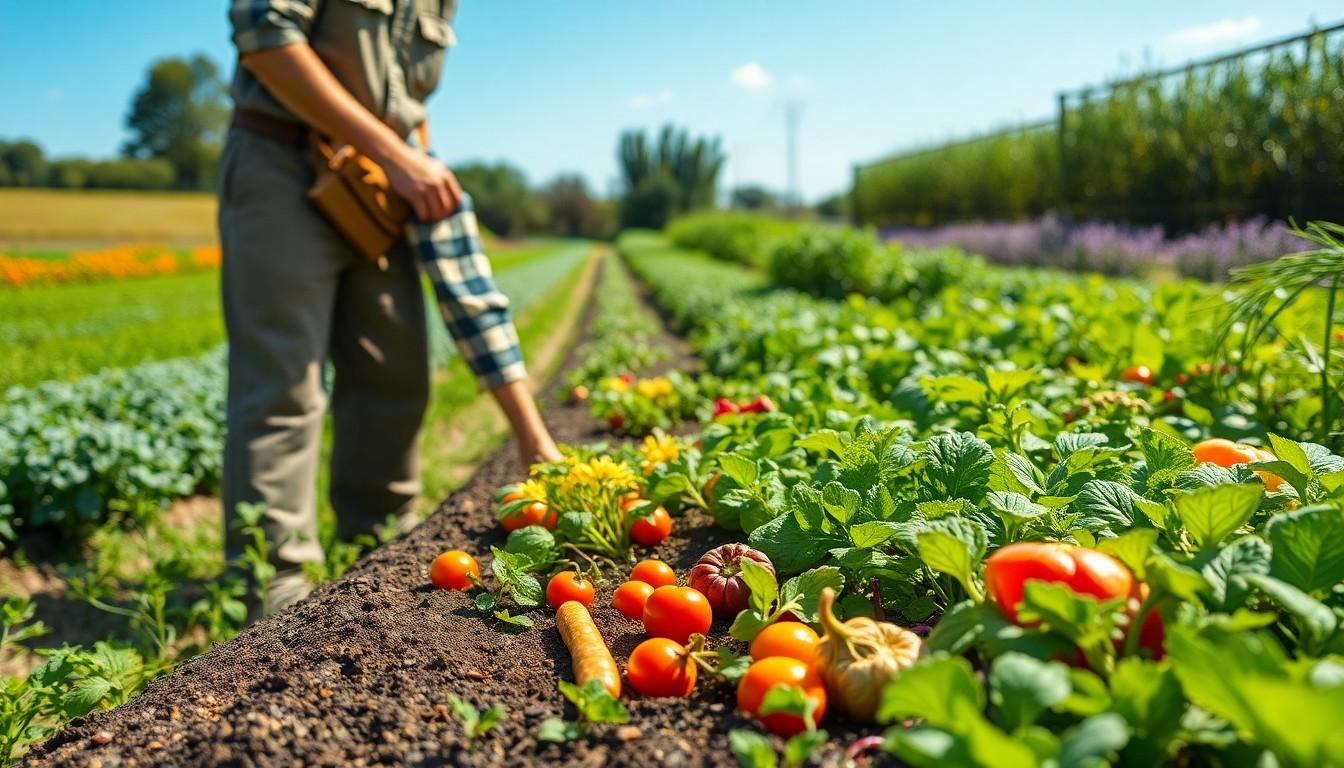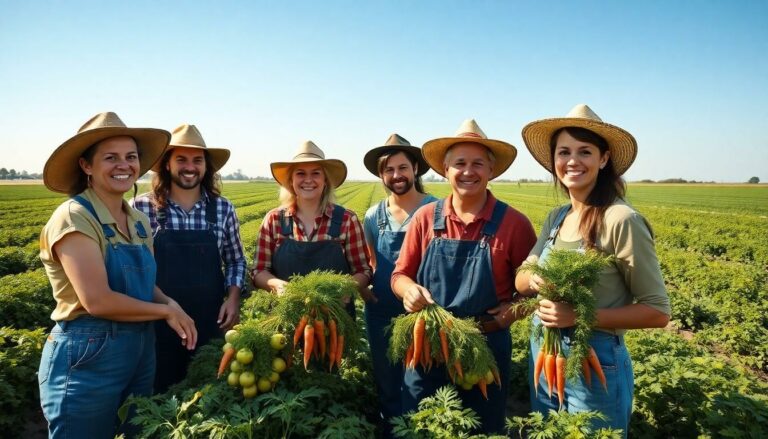Is Organic Farming Better for the Environment? Discover the Truth Behind the Debate

In a world where kale has become a celebrity and avocados are practically gold, the debate over organic farming is heating up faster than a compost pile on a sunny day. Is it really the eco-friendly superhero it claims to be, or just another trend in the grocery aisle? With concerns about pesticides and soil health, many are asking if organic farming is the answer to our environmental woes or just a fancy label on a bag of carrots.
Is Organic Farming Better for the Environment
Organic farming emphasizes sustainable practices to promote environmental health. It prohibits synthetic pesticides and fertilizers, relying instead on natural alternatives. Soil health plays a crucial role, as organic farmers focus on improving and maintaining soil quality through composting and crop rotation.
Crops grown organically often attract beneficial insects and biodiversity, supporting ecosystems. This farming method enhances water conservation by improving soil structure and increasing its ability to retain moisture. Animal welfare is another priority; organic farms provide more space and better living conditions for livestock.
Several certifications exist for organic farming, ensuring compliance with designated standards. The USDA organic label is one of the most recognized, signifying that a product meets rigorous organic criteria.
Organic farming can also reduce pollution by minimizing chemical runoff into waterways. In contrast to conventional methods, it helps preserve natural habitats and promotes a more diverse agricultural landscape. Studies suggest that organic farms often report higher levels of biodiversity compared to conventional farms.
Food products from organic farming tend to exclude genetically modified organisms (GMOs). These practices appeal to consumers concerned about food safety and environmental impact. Increasing knowledge about the benefits of organic farming continues to drive demand for organic products.
Ultimately, organic farming presents an alternative to conventional agriculture. Understanding its principles and outcomes can guide consumers in making informed choices about their food sources and environmental footprint.
Environmental Benefits of Organic Farming

Organic farming significantly contributes to environmental health through sustainable practices. It emphasizes soil health and biodiversity, while also implementing effective water conservation techniques.
Soil Health and Biodiversity
Soil health thrives in organic farming systems. Organic practices, such as crop rotation and composting, enhance soil structure and nutrient content. Beneficial microorganisms and earthworms flourish in organically managed soils. Increased microbial activity leads to improved nutrient cycling, which benefits plant growth. Biodiversity also experiences a boost in organic farms, as they attract various beneficial insects, which naturally control pests and pollinate crops. Studies indicate organic farms often host 30% more species compared to conventional farms, fostering a balanced ecosystem. This rich biodiversity contributes to the resilience of agricultural systems, enabling better adaptation to changing environmental conditions.
Water Conservation Practices
Water conservation ranks highly among the advantages of organic farming. Organic practices build soil structure, thereby promoting water retention. Healthy soils absorb rainfall more effectively, reducing runoff and erosion risks. Techniques like mulching and cover cropping further minimize evaporation and maintain moisture levels. Research shows that organic soils can retain up to 25% more water than conventional systems. These practices ultimately contribute to less frequent irrigation needs, preserving precious freshwater resources. Not only does this type of farming support sustainable water use, it has a significant impact on local ecosystems, helping maintain the health of aquatic habitats.
Challenges of Organic Farming
Organic farming presents several challenges that can impact its overall effectiveness. Resource limitations often arise, making organic farming more difficult for some farmers. Access to organic seeds can be restricted, as only a limited number are certified for organic cultivation. Financial constraints frequently hinder organic farmers from obtaining necessary inputs like compost or natural fertilizers. Market competition from conventional farming can lead to price disparities, discouraging potential organic growers.
Pest and disease management poses additional difficulties in organic farming. Without synthetic pesticides, farmers rely on natural methods to control pests. This dependence sometimes results in higher labor demands and increased monitoring. Disease-resistant crop varieties are not universally available, which further complicates pest management efforts. Effective strategies include crop rotation and companion planting, but these require careful planning and execution. Organic farmers often face ongoing challenges in maintaining crop health while minimizing losses.
Comparison with Conventional Farming
Organic farming fundamentally differs from conventional practices. This difference primarily manifests in its environmental impacts, particularly regarding carbon footprint and chemical usage.
Carbon Footprint Analysis
Organic farming typically results in lower carbon emissions. Data shows that organic farms emit approximately 25% less carbon dioxide compared to conventional farms. This reduction arises from organic practices favoring crop rotation and cover crops that sequester carbon in the soil. Improved soil health on organic farms enhances carbon retention, further contributing to lower emissions. Studies suggest that organic farming promotes sustainable land use, which supports ongoing carbon absorption, positively affecting climate change mitigation.
Chemical Usage and Its Impact
Organic farming prohibits synthetic chemicals, reducing overall environmental pollution. Research indicates that organic farms use about 50% fewer agrochemicals than conventional farms. The lack of harmful pesticides and fertilizers minimizes chemical runoff that can contaminate waterways and harm aquatic ecosystems. Organic methods, like natural pest control, foster a balanced ecosystem that actively supports biodiversity. Additionally, healthier soil in organic systems promotes greater resilience against pests and diseases, resulting in fewer synthetic inputs needed over time.
The Future of Farming
Organic farming presents a compelling case for environmental sustainability through its focus on natural practices and biodiversity. By reducing reliance on synthetic chemicals and enhancing soil health, it fosters ecosystems that are more resilient and productive. The benefits of organic methods extend beyond individual farms, contributing to cleaner water sources and healthier habitats.
While challenges exist in scaling organic practices, the positive environmental impact cannot be overlooked. As consumers become more aware of their food choices, supporting organic farming can lead to a more sustainable future. The decision to choose organic not only reflects a commitment to personal health but also to the health of the planet.



